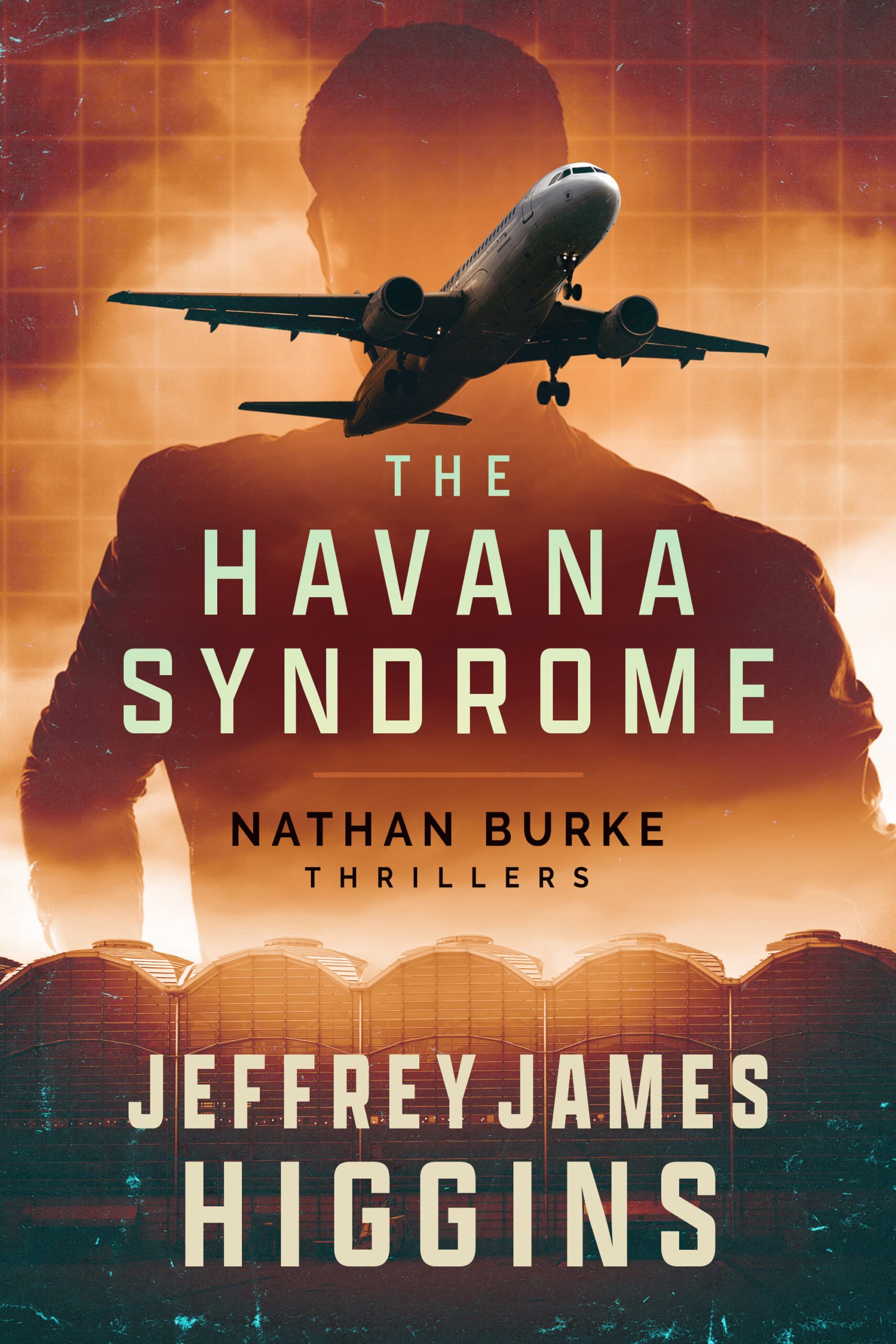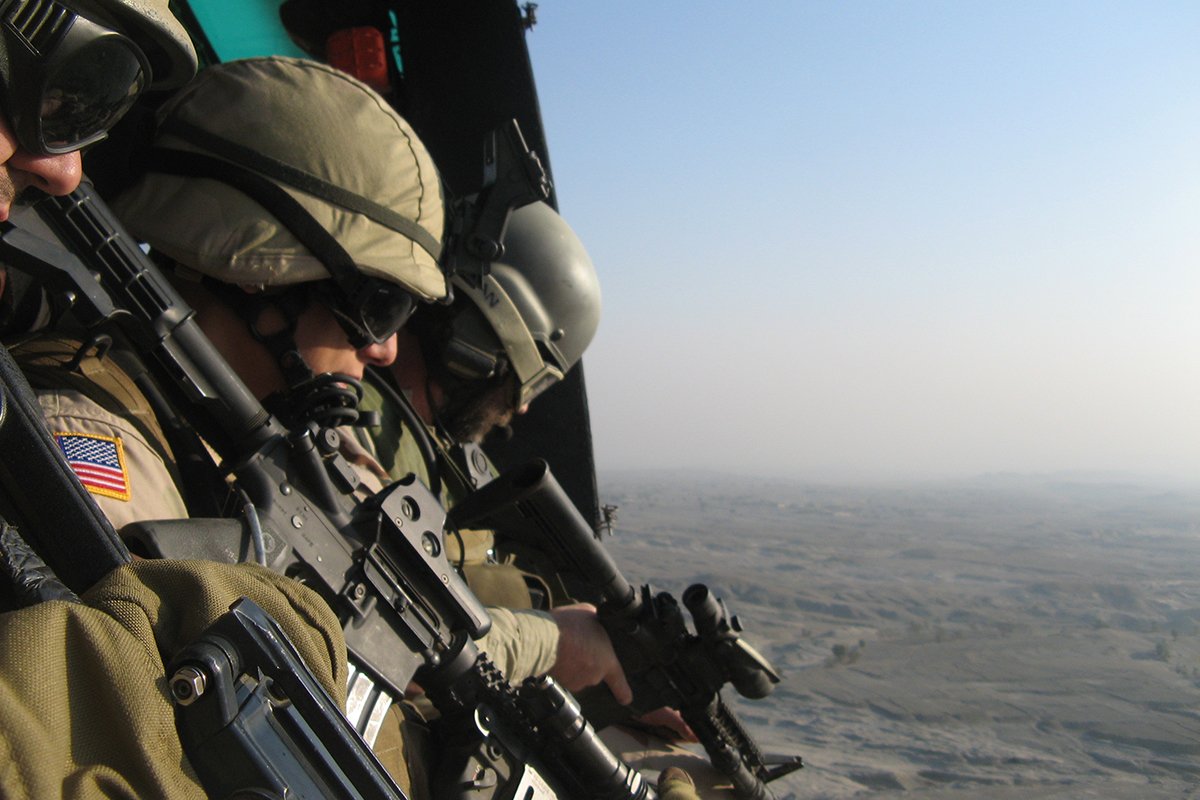Photo: Armed personnel in military gear strategise from inside a helicopter during a reconnaissance mission, surveying the vast, arid landscape of Nangarhar with focused determination and readiness for action. Photo is courtesy of JJ Higgings
A Journey Through Crime, Redemption And The Shadows Of Experience
Jeffrey James Higgins discusses his thrilling novels, the impact of his law enforcement career on his writing, and insights for aspiring authors.
Jeffrey James Higgins, a masterful storyteller and former supervisory special agent, seamlessly fuses his remarkable real-life experiences with thrilling narrative to create gripping and authentic tales. A published author with numerous accolades to his name, including the Claymore Award and PenCraft’s Best Fiction Book of the Year, Higgins captivates readers with his compelling prose, where the shadows of his past inform the characters and plots that leap off the page.
His debut novel, Furious, set the stage for his career by immersing readers in atmospheric maritime suspense that echoes his personal adventures at sea. Further demonstrating his prowess, The Forever Game has earned recognition as one of the best medical thrillers of the 21st century, while The Havana Syndrome, the first in the Nathan Burke international espionage series, has received a starred review from Library Journal.
Beyond his literary achievements, Higgins is known for his active engagement in the writing community, mentoring both budding writers and established authors through his literary salon in Alexandria, Virginia. His expertise in criminal justice and journalism provides him with a wealth of knowledge that enriches his narratives, allowing readers to feel not just entertained but also immersed in a world filled with moral ambiguity and intricate conspiracies.
In this issue of Reader’s House, we are thrilled to present an exclusive interview with Jeffrey James Higgins, where he shares insights into his creative process, the influences behind his compelling characters, and the fine balance between authenticity and storytelling. Join us as we explore the mind of an author whose experiences shape thrilling tales that challenge readers to confront their own notions of justice and morality.
How did your experience as a DEA supervisory special agent influence the authenticity of the investigations in The Havana Syndrome?
I’ve always wanted to be a writer, and I began my professional career as a reporter and news editor. When I lost my job, I took a position as a private investigator to gain life experience for my books. That led to 25 years of law enforcement before I returned to writing.
“I’ve always wanted to be a writer… that led to 25 years of law enforcement before I returned to writing.” – Jeffrey James Higgins
As a deputy sheriff, and was assigned to patrol, auto-theft, street crimes, and the Organized Crime Bureau. Two weeks into my training, I had my first shooting, and I spent the next five years in car chases, fights, and undercover roles.
With DEA, I investigated transnational criminal groups in New York City. On September 11, 2001, I was in the first group of 3 people to reach the north tower after it collapsed. I stood in the rubble choking on toxic air and swore I’d use my skills to hunt terrorists. I was temporarily assigned to the Joint Terrorism Task Force in NYC, then the Department of Homeland Security’sWatch Center in Washington, DC. I helped standup the DEA’s Kabul Country Office as the assistant country attaché and worked the first undercover case in Afghanistan since before the Taliban regime. I was a founding member of FAST, DEA’s foreign tactical teams, where I made the first narco-terrorism arrest. I transfered to the Special Operations Division and chased terrorists around the world. I convicted the world’s most prolific heroin trafficker and arrested an Iranian operative for attempting to purchase IGLA-S surface-to-air missiles.
My experience hunting terrorists and transnational criminals allows me to write about federal investigations with authenticity.
“People read to experience difficult situations without exposing themselves to actual danger.” – Jeffrey James Higgins
Kirkus praised Furious for its atmospheric maritime suspense—how did you create that sense of isolation at sea?
Furious will always be special to me because it was my debut novel. When I was 16, my father and I sailed from Bermuda to Gloucester, Massachusetts. Only one of the six people on our 37-foot vessel had significant sailing experience, and that made for an interesting voyage.
We lost our navigation gear, and had a faulty compass, so our five-day journey turned into eight. Along the way, we hit serious storms with waves taller than our mast.The night sky at sea is something I’ll never forget, and despite my seasickness, it was an amazing adventure. I drew on that blue-water sailing experience when drafting Furious, and I tried to convey the feeling of being in the middle of the ocean to the reader. Our trip certainly had fewer obstacles than Dagnyfaced in Furious.Now, I sail the Potomac River for fun, and while the mechanics are the same, there’s nothing like venturing into deep water.
In Unseen: Evil Lurks Among Us, your protagonist Malachi Wolf tackles radical ‑Islam ‑linked murders—how did your narco‑terrorism background shape the plot?
I relied on both my career experience and my wife’s academic knowledge when writing Unseen. Cynthiais the world’s leading expert on the Muslim Brotherhood, and she provided me with deep insights into the radical infiltration of the West. She authored the book, The Secret Apparatus, which is used by numerous government agencies, think tanks, and universities to understand the command and control behind radical Islamic terror groups.
In Unseen, my protagonist, Detective Malachi Wolfe chases a vigilante killer and uncovers a terrorist conspiracythat threatens the country. In The Havana Syndrome, FBI Special Agent battles Islamists, spies, and traitors. I’ve been inside huge federal investigations, which helps me show my readers what it’s like to uncover conspiracies.
What inspired the theme of moral ambiguity in your crime thrillers, given your law ‑enforcement and journalistic past?
All my protagonists struggle with ethical questions when unexpected events put them through crucibles. A common theme in my work is man versus institution, and when the rule of law fails, justice and legality don’t always mesh. I force my characters to make difficult decisions with high stakes. While situations are rarely black and whiteand often create dilemmas, I don’t believe in moral relativism. Good and evil objectively exist.
You retired as a supervisory special agent in 2017 and became a full-‑time writer—how did that transition challenge you creatively?
I’ve always identified as a writer, even though I took a 25-year professional hiatus. I wish I’d written over those years, but I retired at my first opportunity to return to my calling. I wrote full time for 5 years, then my wife and I opened a restaurant and a literary salon where I’ve interviewed over 100 authors. I write every day in the early morning, which allows stories to live in my subconsciousness. A consistent writing habit is the key to hitting deadlines and becoming a prolific author. I have hundreds of novel ideas, and though I won’t live long enough to write them all, my goal is to publish thirty books. Life is unpredictable, but I’ll do my best.
Your nonfiction experiences (eg in Afghanistan) often surface in your fiction—how do you balance factual detail with storytelling flow?
I never reveal anything classified in my work, but I relate authentic action and emotion based on my career. I know what its like to fight for my life, get shot at, and have rockets explode near me. I hope to bring those visceral moments to readers, I write several genres of thrillers, and I always infuse them with my personal and professional memories. I also write narrative nonfiction, which conveys real experience but uses writing techniques found in fiction.
Both Furious and Unseen explore catastrophe and redemption—what draws you to characters facing profound moral crucibles?
People read to experience difficult situations without exposing themselves to actual danger. If readers immerse themselves in a story, they put themselves in a character’s place and feel the same emotions. Thrillers can also be intellectual exercises where readers can decide how they’d react in similar circumstances, without real-world consequences. Story is how we enterain ourselves, but it’s also how we learn.
What key advice would you offer aspiring authors hoping to write credible thrillers drawing on professional experience?
Write stories that excite you. If you craft athriller you want to read, others will love it too. Remember, while people like to learn from books, the writer’s first goal is to entertain. Novels need to be accurate enough not to make mistakes that pull the reader out of their dreamlike state, but avoid the urge to dump everything you know into them. If you don’t have a background in whatever you’re writing about, interview experts. If you have fun writing your book, the reader will enjoying reading it.
EDITOR’S CHOICE
An exhilarating blend of emotion and action, Higgins delivers a thrilling narrative that keeps readers on the edge of their seats.



